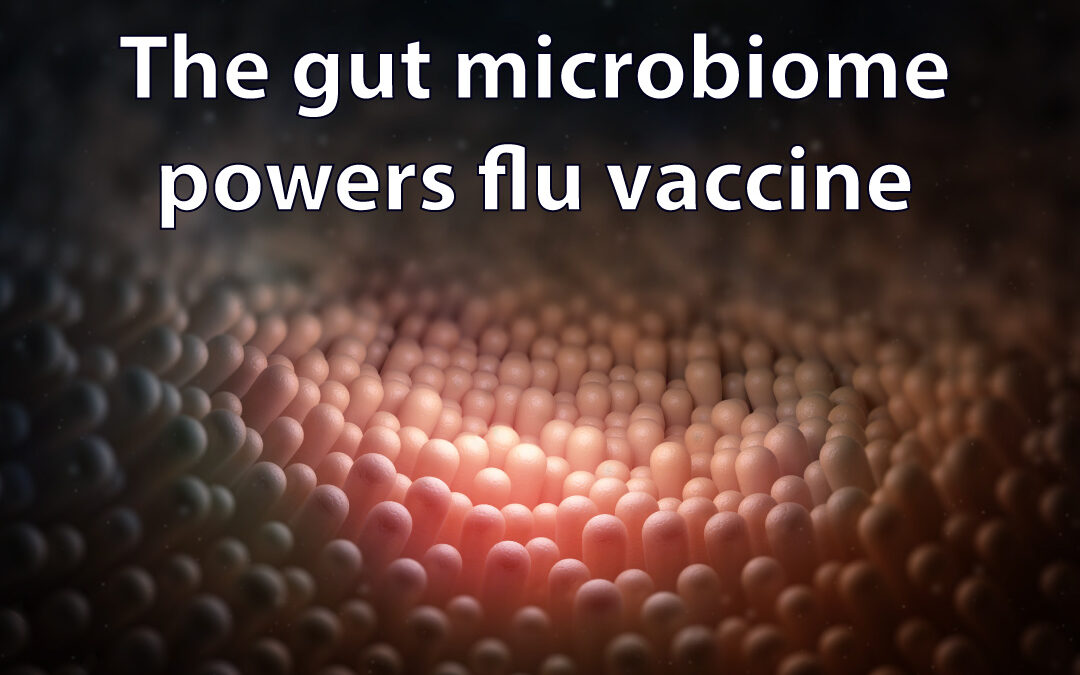Our gut talks the language of our immune system, playing a key role in the complex mechanisms of immunoregulation. If antibiotics are essential to kill pathogenic bacteria, it is also true that they change the composition and metabolism of the gut microbiome, the communities of beneficial bacteria that live in human intestines. In a recent paper published in Cell, Hagan et al. investigate how antibiotic-driven depletion of the gut flora can influence vaccination responses in humans.
Over 2000 years ago, Hippocrates famously stated that ‘all disease begins in the gut’. In our opinion, he was absolutely onto something! Fast forward to today, and a growing body of evidence is suggesting that a healthy gut really is the foundation of our health and wellness. Our gut houses over 100 trillion bacteria that have specifically coevolved with us and form an inner complex and highly diverse ecosystem known as our gut microbiome.
It is becoming increasingly clear that our gut is closely connected to our immune system. In fact, about 70% of our immune system resides in and around our gut (Vighi et al. 2008). The immune system protects against the spread of pathogenic germs in the intestine, but at the same time allows the colonisation of beneficial microorganisms. Conversely, the composition of the microorganisms in the intestine influences the quality of any immune reaction.
Like any other ecosystem, our gut microbiome exists in a delicate balance, in which microorganisms compete for food, resources, and real estate to survive and thrive. The majority of the antibiotics available at this moment have a broad spectrum of activity, and they act not only on pathogens but also on beneficial members of the gut microbiota (Blaser MJ, 2016). After antibiotic treatment, gut microbiotas typically take a long time to recover their pre-antibiotic composition (Francino & Moy, 2013). To study the role of the human gut microbiome in shaping immune responses to seasonal influenza vaccine, Hagan et al. have studied the immune responses in antibiotic-treated and non-antibiotic-treated volunteers that received the trivalent inactivated influenza vaccine over two seasons.
One group of 22 healthy volunteers aged 18–45 years were enrolled, of which 11 received a 5-day course of a broad-spectrum oral antibiotic (aimed to deplete Gram-negative, Gram-positive, and anaerobic bacteria in the gastrointestinal tract) before receiving the vaccine. Biological samples were collected at various times up to 1 year after vaccination to track the participants’ immune response to the influenza vaccines, as well as the diversity and abundance of the organisms in their gut microbiomes. As expected, compared to the control group, the antibiotic-treated subjects suffered decreased levels of gut bacteria that were not fully recovered at 6 months, indicating long-lasting loss of unique bacterial species.
Also, among the participants who had little prior immunity to the seasonal influenza virus vaccine strains, a course of antibiotics hindered their immune responses to H1N1 A/California-specific virus, one of the three influenza virus strains in the vaccine. This finding suggests that those receiving antibiotic treatment prior to vaccination will be less able to mount an immune response when subsequently exposed to this H1N1 virus.
The researchers also found that people who took antibiotics experienced cellular and transcriptional changes within their immune system, which indicates a proinflammatory state similar to a condition seen in older adults who have received influenza vaccines. This pro-inflammatory state was found to be strongly associated with the process by which the microbiome regulates the metabolism of bile acids. In the intestine, primary bile acids are processed by the microbiota to generate an array of steroidal molecules known as secondary (or degenerated) bile acids. All bile acid species are signalling molecules, exerting pleiotropic activities in metabolic and non-metabolic tissues by activating a family of evolutionarily conserved receptors collectively known as bile acids activated receptors (BARs). BARs are highly represented in cells of innate immunity, such as intestinal and liver macrophages, dendritic cells, and natural killer T cells. A decreased number in the gut flora following antibiotic treatment disrupts bile acid metabolism, which in turn leads to an increase in the inflammatory response.
Our microbiomes change naturally as we age; there is evidence that the gut microbiota of the elderly is less capable of producing immunomodulatory metabolites. The authors suggest that further research on these pathways could provide insights into why older adults respond differently to influenza vaccination and why they have weaker immune systems overall.
References
Vighi et al., Allergy and the gastrointestinal system, Clin Exp Immunol, 2008
Blaser Mj, Antibiotic use and its consequences for the normal microbiome, Science, 2016
Francino PM and Moy A., Effects of antibiotic use on the microbiota of the gut and associated alterations of immunity and metabolism, Eur Med J Gastroenterol, 2013




